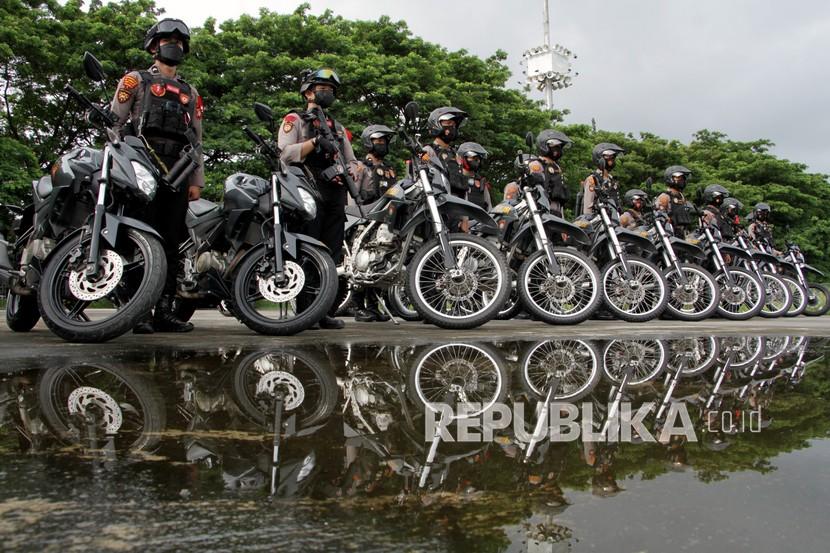Menpan RB Tjahjo Kumolo believed that the national police should remain independent as an instrument of the state.
REPUBLIKA.CO.ID, JAKARTA – Minister of Empowerment of State Apparatuses and Bureaucratic Reform (Menpan-RB) Tjahjo Kumolo responded to the proposal of Police under the auspices of the ministry. The proposal comes from an internal study by the National Resilience Institute.
However, said Tjahjo, the position of the police must remain independent as an institution. “The National Police must be independent as an instrument of the State like the BIN and the TNI”, declared Tjahjo, Sunday (3/1) in the night.
Therefore, he said, the government is not currently considering merging the police into a ministry. “What I understand is that there is no Polri plan under the ministry,” said the former interior minister.
A police observer, Inspector General of Police (Purn) Sisno Adiwinoto, also considered that the placement of the national police organization under the president as currently applicable is appropriate and in line with the constitution. of the Constitution of 1945. 2 of 2002 ”, declared Sisno in his written statement to Republic, Monday (3/1).
Therefore, according to him, the proposal to place the Polri organization under the supervision of the ministry is an unconstitutional thought. He considered that the speech in fact negated the unitary state of the Republic of Indonesia as the rule of law.
In addition, he also considers the Lemhannas proposal to be not only obsolete, but is seen as a reckless idea that does not include the police system in the world or the police system in effect in Indonesia.
Sisno explained that the police system in the world is divided into three, namely centralized, dispersed and integral. A number of countries that adhere to a centralized police system are France, Italy, China, the Philippines, Thailand and Malaysia.
Then the political system spread (fragmented) as in the United States, Canada, United Kingdom, Belgium and Integral as in Japan, Germany, Australia and New Zealand. “The Indonesian police (Polri) is moving towards an integral system, but it is still centralized. The police used a distributed system from the proclamation of independence until June 30, 1946, where there were Surabaya police, Medan police, Bandung police, and Makassar police called Hoof Bireuo ” , did he declare. KBPP police advisor.
Read also :
He also highlighted a number of principles that the national police should be led by the president. First, to enforce law, order and security, there must be a state instrument (the police) that simultaneously exercises the functions of the president’s administration in the area of security and order. .
Second, the police administration system in all countries is linked to the state administration system, criminal justice system and state security system of that country. Likewise, the Indonesian state, although there are amendments to the Constitution of 1945, it is a fact that since July 1, 1946, the national police force is the national police force under the Prime Minister / President “, did he declare.
In addition, Sisno said, placing the national police under the president allows the chief of the national police to participate in cabinet meetings so that the situation can directly follow the development of the national situation so that they can act quickly to overcome any real and strategic problem. The participation of the head of the national police in cabinet meetings does not mean that the head of the national police is a minister as a member of the cabinet, but only as a “member of the cabinet”, to be precise, an official of the cabinet. the state at ministerial level.
In addition, the position of the national police in the state administration system that reports to the president means that the national police are an instrument of the central government whose scope of authority covers the whole of Indonesian territory. Regional police units (polda at provincial level, regional police at district / city level and police at sub-district level) are instruments of the Indonesian national police in the regions, not regional.
Read also : Bambang Widjajanto: Adnan Buyung Nasution gave birth to many great people
“The 1945 Constitution, MPR Decree No. VII / MPR / 2000, as well as Law No. 2 of 2002, emphasize that the Indonesian National Police, as an instrument of the State that maintains security and public order, has a duty to protect, protect, serve the community and uphold the law, ”said the chief consultant to the police chief.
“As an instrument of the state, the National Police are subordinate and accountable to the President as Head of State.head of state). Based on the principles mentioned above, it is correct and very appropriate that the police report directly to the President, and not to ministers, ”he said.
Read also : This is the prediction of the start of Ramadan 2022
Previously, the Governor of the National Resilience Institute (Lemhannas) Lt Agus Widjojo proposed the formation of the National Security Council and the Ministry of Internal Security. Especially for the Department of Homeland Security, Agus said, he will later oversee the Indonesian National Police (Polri). The proposal is based on the results of an internal study at Lemhannas.
According to Agus, security issues are indeed included in the portfolio of the Interior Ministry (Kemendagri). However, if the Ministry of Interior (Mendagri) has a lot of duties and responsibilities, it is necessary to form a Ministry of Internal Security, of which the National Police is under its coordination. It is also like the Indonesian National Army (TNI) which is under the auspices of the Ministry of Defense (Kemenhan).
“To achieve security and order, we need the police, namely the National Police. It must be placed under a ministry, and the National Police like the TNI, an operational institution. Operations must be formulated at ministerial level by a political body. institution from which policies are formulated, defense by the TNI and security and order by the police, ”said Agus.

“Internet evangelist. Extreme communicator. Subtly charming alcohol aficionado. Typical tv geek.”
